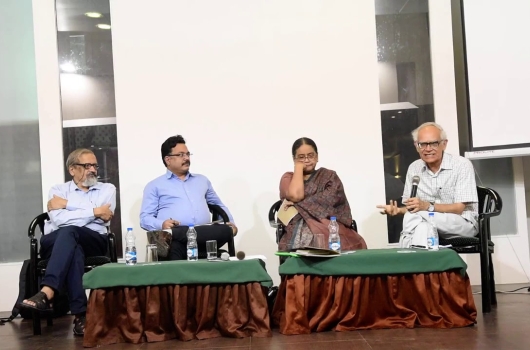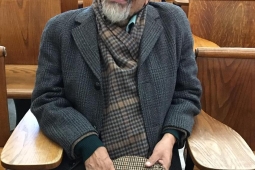
Hari Vasudevan and the Soviet Archives : A Personal Remembrance
Sobhanlal Datta Gupta, "Hari Vasudevan and the Soviet Archives: A Personal Remembrance", Mainstream, May 20, 2020
It was May, 1995, exactly 25 years ago. Hari Vasudevan (Calcutta University), Purabi Roy (Jadavpur University) and I myself (Calcutta University) were in Moscow for two months, working as a team sent by The Asiatic Society, Calcutta in connection with a project of collection of documents from the newly opened Soviet archives on Indo-Russian Relations : 1917-1947. This project was the result of a Protocol signed between The Asiatic Society, Calcutta and Moscow’s Institute of Oriental Studies. With extremely limited funding we were expected to prepare catalogues of as many documents as possible and bring home photocopies/microfilms of those documents which we considered most important, depending, of course, upon their accessibility. It was a Herculean job, since we had no idea of the materials we had to handle. Working on hundreds and hundreds of documents, catalouging and copying them (in many cases because of paucity of funds and since we had no laptop, quite often we had to take down a document by hand) demanded a division of labour. While Purabidi worked in the State Archives of the Russian Federation (GARF), Archives of the Ministry of External Affairs (MID), Russian State Military Historical Archive (RGVIA), Hari and I worked in the former Central Party Archives, Institute of Marxism-Leninism (now known as Russian State Archive for Social and Political History or RGASPI ).
In Moscow Hari and I stayed together in the same apartment. Every morning normally we used to leave for our destination by 9AM so that we could catch the metro on time. I was struck by his culinary skill, since I was a complete novice in the art of cooking. A person of fine taste and a connoisseur of food and drinks, his presence was always so enviable everywhere ! His proficiency in Russian language and his familiarity with Moscow greatly facilitated our stay. Extremely jovial as he was, he had many friends, especially among the journalists in Moscow. He had very good contacts in the Indian Embassy too. This greatly helped us in booking our return flight to India in July, since our open ticket posed a big problem in the summer rush.
Coming to our archival work, both of us decided to work in the Comintern section, since this was the biggest repository of materials on India. Incidentally, it should be mentioned here that Hari’s primary area of research was pre-revolutionary Russia. But his encounter with the Comintern archives enthused him so much that he now became passionately interested in the activities of the Indian revolutionaries in the Soviet Union. This led him to collect materials on the Ghadar Party, training of Indians in the Communist University of The Toilers of the East (KUTV), the transcripts of the Indian Commission in Comintern, the Soviet Communist Paty’s perception of India at the time of independence, as revealed in a conversation between S.A. Dange and Yuri Zhdanov on 16 August, 1947 in Moscow. Our work in the archives was greatly facilitated by the support extended to us by R.B. Rybakov, Director, Institute of Oriental Studies, Moscow, P.M. Shastitko, T. Zagorodnikova, A. Kolesnikov and last, but not the least, M.A. Sidorov. Valuable inputs were provided by Leonid Mirokhin and M.A. Persits, two most distinguished scholars working on the period we covered, when we met them in Moscow. To cut down photocopying costs, Hari collected a vast range of material on microfilm and M.A. Sidorov was a big help in this regard.
On our return, Purabidi and I joined The Asiatic Society in 1996 for a fixed term, taking leave from our respective Universities. Hari remained in the Department of History, Calcutta University, while very actively collaborating with us in the indexing of the documents which we had collected and preparation of two volumes of the archival materials, proposed to be published by The Asiatic Society. This involved editing, translation, providing annotations and biographical notes. Parallel to this work, which was extremely laborious and time-consuming, we had already commenced work on publication of a checklist of the documents we had worked on in the Russian archives. The first volume of this Checklist was published by The Asiatic Society in 1997 under the title Purabi Roy, Hari Vasudevan, Sobhanlal Datta Gupta (Eds), Indo-Russian Relations : 1917-1947. Checklist of Documents. Vol. I (Calcutta : The Asiatic Society, 1997). By going through this Checklist it was now possible for the first time to have a glimpse of the materials on India which the closely guarded Soviet archives contained. The documentation provided the title of each document, its archival location, the folio and file reference. For a researcher this was an invaluable guide to the Soviet archives on Indo-Russian relations 1917-1947.
Thereafter, as we proceeded in our work on the publication of the texts of the documents, we began to face insurmountable resistance, quite surprisingly, from a section of the Left establishment in West Bengal. We were threatened, maligned and discouraged not to proceed with this work any further and ridiculed for our research on documents which were described as “fake” and “doctored”. Eventually, after fighting a relentless battle against this calumny between 1996 and 2000 we could publish two volumes of these documents under the title Purabi Roy, Hari Vasudevan, Sobhanlal Datta Gupta (Eds), Indo-Russian Relations : 1917-1947.Select Documents from the Archives of the Russian Federation. Part I : 1917-1928 ; Part II : 1929-1947 (Calcutta : The Asiatic Society, 1999 and 2000). It needs, however, to be known today that a large part of this documentation was prepared by the three of us clandestinely, at times in Calcutta University and in Purabidi’s and my house. Quite often, in order to ensure Hari’s participation, we had to organize these meetings beyond office hours , so that he could join after his classes in the University were over. This took days and months and in each session Hari’s presence was absolutely indispensable. Purabidi did not have any computer, I had just acquired one and was yet to start off, while Hari had already developed the skill and did most of the typographical work on computer, apart from providing valuable inputs to the organization of the two volumes.
Our findings from the Russian archives, however, evinced hardly any interest in the academic circles of West Bengal. While Hari and I knocked at many doors, the pet reply that we used to get from many established Left intellectuals was that privately they were keen to know about and discuss our research, but publicly they could not proceed in this matter for fear of being “blacklisted”. In the period 1995-2000 only three events could be organized. Immediately after our return, in 1995, on the initiative of Professor Anil Kumar Sarkar, the then General Secretary of The Asiatic Society, who was instrumental in launching the project of Indo-Russian Relations and signing the Protocol with the Russian Federation, a day-long seminar was organized at The Asiatic Society where we made our presentations. This was followed (I do not remember the exact year) by a meeting privately organized by the late Professor Buddhadeva Bhattacharyya, a distinguished Marxist intellectual and my senior colleague in the Department of Political Science, Calcutta University, where we shared our findings with a small audience. Thereafter, as we were nearing completion of the two volumes of documents amidst great difficulties, Hari came out with the idea of organizing an exhibition of the select documents which went into the making of these volumes. This was a wonderful idea but our problem was that in Kolkata it was not possible to hold this event for reasons already explained. Hari then single-handedly organized this exhibition in 1999 at the India International Centre, New Delhi, which was supported by The Asiatic Society, braving many hurdles. It was an exhibition of photocopies of select documents from the Soviet archives, accompanied by annotations. Among the many distinguished visitors I still remember the presence of Professor Sumit Sarkar and Tanika Sarkar who so warmly appreciated the exhibition and the efforts of Hari in making this event so successful.
The stock of materials from the Russian archives was so huge that they could not be accommodated in the two volumes published by The Asiatic Society in 1999-2000. We had to set aside a stock of materials, exclusively in Russian, a large part of which had been collected by Hari on microfilm. They had to be accommodated in a separate volume and involved translation costs. Meanwhile our terms in The Asiatic Society were over and there was a change of guard in the Society. In the new situation we submitted a proposal for publication of a third volume, which would complete the project on Indo-Russian Relations 1917-1947. Since we were no longer connected with The Asiatic Society in any official capacity, we stated in our proposal that we would voluntarily lend our expertise to the continuation of the project the only important financial component of which was the engagement of a good translator by the Society. Not to our surprise, the proposal was cold-shouldered and The Asiatic Society project thus remained incomplete.
Thereafter Hari quite often used to discuss with Purabidi and me the idea of bringing out a second Checklist of documents collected from the Russian archives since the publication of the first Checklist in 1997 by The Asiatic Society, as mentioned earlier. Meanwhile Hari and Purabidi had undertaken several trips to Russia and supplemented our first collection with new stock. This was facilitated by Hari’s joining the Maulana Abul Kalam Azad Institute of Asian Studies (MAKAIAS), Kolkata as Director and Purabidi’s association with this Institute as Project Fellow. Consequently, in 2012, again on the sole initiative of Hari, it was possible to bring out, under the auspices of MAKAIAS, the second Checklist entitled Purabi Roy, Sobhanlal Datta Gupta and Hari Vasudevan (Eds.), Indo-Russian Relations : 1917-1947. Select Archives of the Former Soviet Union. An Inventory (Delhi : Shipra Publications, 2012). This volume followed the same style of indexing of documents which was adopted in the 1997 publication. These two volumes taken together constitute, till now, the best possible guide to materials on Indo-Russian relations 1917-1947 in the Russian archives. The two volumes cover materials located in the following archives : Russian State Archive for Social and Political History (RGASPI), State Archive of the Russian Federation (GARF), State archive of the Russian Economy (GAE), Archives of the Academy of Sciences, Central Archives of the October Revolution, St. Petersburg, Archives of the Ministry of External affairs (MID) and Russian State Military Historical Archive (RGVIA).
Since the opening of the Russian archives, especially after Hari joined the MAKAIAS, he developed a passionate interest in the archives of the former Soviet Union. His untimely death is a lethal blow to archival research on India-Russia relations covering pre-revolutionary, revolutionary and post-revolutionary Russia. In the foreseeable future it will be impossible to fill this void. Hari’s demise has gripped me with a sense of emptiness. I am trying my best to accept the unacceptable.
The author Sobhanlal Datta Gupta is Former Surendra Nath Banerjee Professor of Political Science, University of Calcutta.


